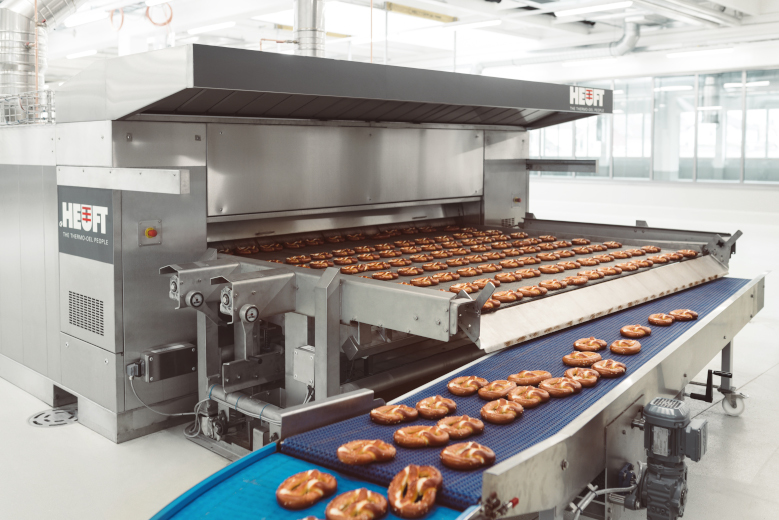
Energy consumption is undisputed at the top of the industry’s concerns and efforts for improvement. Tunnel ovens offer opportunities to go the extra mile on the path to resource savings.
Thermal oil oven efficiency by HEUFT
The eight-generation oven builders at HEUFT have also been observing a surge in the interest in economical and flexible machines, now a universal top priority in the industry. Sharp energy supply disruptions have shown the financial value of having a flexible system that can adapt all types of pre-existing heating methods to the cheapest and/or immediately available energy source. Low consumption is a given among requests as well. Hybrid thermal oil heaters can be used in small as well as larger artisanal and industrial bakeries.
At the same time, the big sustainability picture is not lost on today’s energy worries: “More and more bakeries are trying to reduce their carbon footprint and are looking to heating systems with low or without CO2 emissions,” HEUFT notes. The thermal oil technology powering its ovens was already able to run with at least 25% savings compared to traditional technologies, the company says. But, in addition to this, HEUFT offers hybrid solutions that can heat the ovens with green electricity generated through solar panels in the daytime and change to gas or oil at night. “Besides this, we have our Energy Management System (EMM) that allows us to maximize energy savings,” the German oven maker highlights. Using a thermal oil oven in an industrial bakery working with two or three shifts can save big (energy and money), which also makes its payback time extremely short, the specialist observes.
For efficiency, the excess heat in the chimney of the burner is used to heat water, which can then be used in the facility. Possible destinations are the crate washing machines, central heating, or sanitary use. Of the new features, several can be retrofitted onto existing ovens, starting with heat recovery systems. “If the oven is a thermal oil oven, we can also install different or hybrid heating solutions,” HEUFT highlights.
With a very precise temperature control system in every zone, tunnel ovens with independent top and bottom heat in combination with thermal oil heating can avoid temperature drops during the baking process. The result is an efficient, consistent baking process with repeatable product quality.
Thermal oil technology makes it easy to automatically control different temperature zones throughout the oven, with independent top and bottom heat. Special valves with direct reaction help avoid temperature fluctuations in the different zones of the oven. “This process is fully and automatically controlled by the newest Siemens control system,” HEUFT adds.
When building custom ovens, the best way to test possible feature combinations is in the bakery’s own facility, with their own ingredients and with their own equipment, HEUFT believes. This is why its teams can deploy a smaller test oven with all the features of a full-scale industrial oven, equipped with different baking surfaces. The process is entirely replicated and the results are evaluated against the previous/desired results.
The company develops tunnel ovens with one, two and three decks with a continuously running belt. “With several baking system options, such as radiant heat, forced convection, or a mix of both, we are able to bake all types of pastry and bakery products with maximum efficiency,” HEUFT’s specialists explain. Having multiple decks helps save space considerably in the bakery and allows for more flexibility in baking planning.
Read the full article, ‘Efficient baking assignment: tunnel ovens’ in Baking+Biscuit International, issue 5, 2023.
Photo: HEUFT


